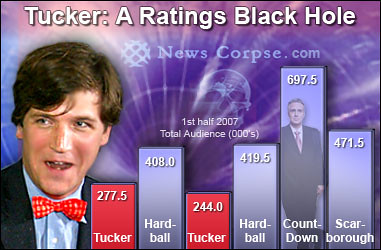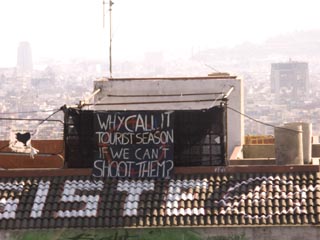When John McCain was asked by a supporter, “How do we beat the bitch,” referring to Hillary Clinton, McCain responded by laughing and saying that it was an “excellent question” which he then proceeded to answer. As an after thought he tosses out an expression of his “respect” for Clinton.
Now McCain’s campaign is outraged that this exchange was covered by CNN. His campaign manager Rick Davis has sent out an e-mail to supporters insisting that CNN owes McCain an apology:
“The CNN Network, affectionately known as the Clinton News Network, has stooped to an all-time low and is gratuitously attacking John McCain for not sufficiently defending Hillary Clinton enough when a South Carolina voter used the ‘B’ word to describe her when John McCain stopped into a luncheon yesterday at the Trinity restaurant in Hilton Head, S.C.”
Really? An all-time low? Lower than during the run-up to the war in Iraq when even CNN’s Christiane Amanpour said the the press had been muzzled and that…
“…my station was intimidated by the administration and its foot soldiers at Fox News. And it did, in fact, put a climate of fear and self-censorship, in my view, in terms of the kind of broadcast work we did.”
Lower than when CNN followed McCain around Baghdad as he proclaimed that there are neighborhoods where we could all take leisurely walks with security? This prompted a response from CNN’s Michael Ware:
“I don’t know what part of Neverland Senator McCain is talking about when he says we can go strolling in Baghdad.”
Does Davis really believe that CNN, by merely reporting McCain’s failure to object to an inappropriately derisive question, sinks to an all-time low? You may think that Davis has reached the pinnacle of hyperbole, but he is only just getting started:
“The liberal media has figured out that John McCain is the only thing that stands between a Hillary Clinton presidency, and they are therefore trying to stop the McCain comeback. Simply put, CNN is scared that John McCain will beat Hillary Clinton. They are right to be scared.”
While Davis asserts that McCain is “the only thing that stands between a Hillary Clinton presidency,” he doesn’t say “and what.” That must be what is terrifying CNN. It’s the fear of the unknown. It couldn’t be McCain’s alleged “comeback” that even Rasmussen, whose poll he cited when answering the “bitch” question, described as follows:
“the Arizona Senator now leads Democratic frontrunner Hillary Clinton by a statistically meaningless two percentage points.”
That’s mighty scary stuff. And leave it to McCain’s campaign to promote fear as a means to counter their perceived political enemies. They want CNN to be scared, just as they want their own supporters to be scared. Did I mention that this alarming email was sent to McCain supporters along with a pitch for donations? You better pony up patriots, because John McCain is the only thing that stands between Hillary Clinton and…..something???


 That sounds ominously like a farewell. This will come as no surprise to News Corpse readers who are well aware of the train wreck that Tucker’s show is on MSNBC’s schedule. I published my analysis of his
That sounds ominously like a farewell. This will come as no surprise to News Corpse readers who are well aware of the train wreck that Tucker’s show is on MSNBC’s schedule. I published my analysis of his  My trip began in Barcelona where I was greeted by this warm tribute to tourism. This message was strategically placed on a rooftop that is visible to the many visitors to the Gaudi-designed Park Guell.
My trip began in Barcelona where I was greeted by this warm tribute to tourism. This message was strategically placed on a rooftop that is visible to the many visitors to the Gaudi-designed Park Guell.